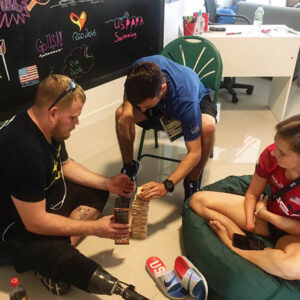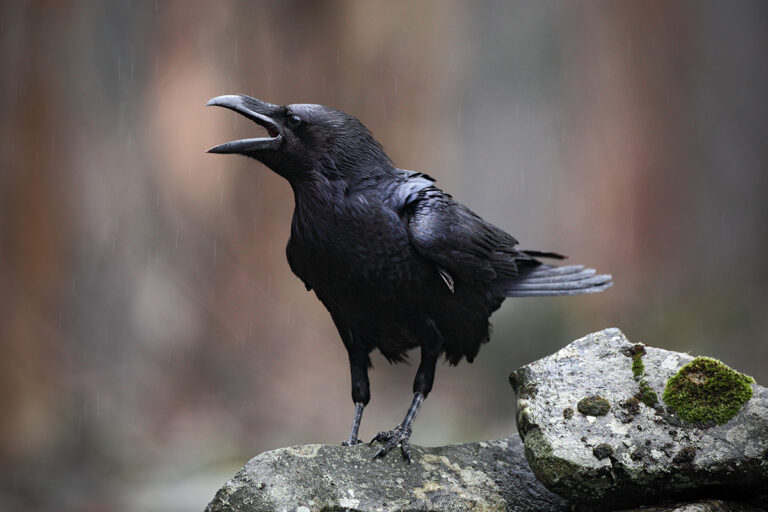What do you do when the fire alarm goes off in your several-story building in Rio de Janerio, which is filled with hundreds of Paralympic athletes, many of whom are wheelchair-bound? This scenario wasn’t hypothetical for Spokane physical therapist and former Olympic rower Jamie Redman, who for five weeks in August and September filled the role of Athlete Services Coordinator for the Team USA Paralympic athletes. The Rio Paralympic Games took place two and a half weeks after the able-bodied games ended. “By the time the Paralympic athletes arrived, most of the kinks had been worked out,” says Redman. “But several issues still came up for us, often involving accessibility for impaired athletes, so it was a big deal when the electricity went out in the elevators.” And as at every games, petty theft was an issue in the Olympic village, so Team USA employed its own housekeeping and security staff. “Because the USOC staff had planned ahead,” Redman says, “our team was able to adapt pretty quickly and seamlessly to most situations.”
While the U.S. Olympic Committee had contingency plans for many potential situations, it would have been hard to foresee the effect that Ryan Lochte’s actions had on both the able-bodied and Paralympic games. “Our staff and athletes were incredibly frustrated, not only about how certain athletes conducted themselves, but also about how it was portrayed in the media. It was frustrating to watch all the goodwill that Americans had built in the months leading up to the games crumble in a single second because of one person. Of course,” she continues, “the Paralympic athletes celebrated and had a good time on the town too, but their discipline was a big success.”
Redman reveled in her up-close interactions with the athletes during training, competition, and down time. “One of the most intimidating moments for me was at the gym on the day before the opening ceremony. Everyone was in there, amped up, in the best shape of their life, and they were sort-of looking over their shoulders, checking out the competition. I went to the gym for a workout and looked around and thought, ‘I am NOT athletic enough to be here!’ On one side of me was an athlete doing 90 pullups, and on the other side of me was an athlete lifting hundreds of pounds with one leg. I was like, ‘I’m going to go do my little ab workout in the corner.’”
Redman was one of the first staff members who athletes would see the morning after their events, and when athletes had turned in disappointing performances, Redman had to rely on her intuition. “These athletes were clearly grieving, humiliated, discouraged. Even after having been an Olympic athlete, it was hard for me to know what to do some of the time. I’ve experienced the thrill of success and the despair of failure. These athletes are superhuman, but they are still human, and they experience the same feelings the rest of us do.”

During down time, athletes from different sports would engage in spirited Jenga tournaments. Other athletes would just sit down, pop in their earbuds, and tune out, but it was an opportunity they took to be among their people more passively. And then there were the budding romances among young athletes. “They’d actually come to me and say, ‘Does she like me? I don’t know. We have this incredible connection, but I just met her three days ago.’ My advice was always to sympathetically say, ‘Maybe wait until after the games.’”
Redman was consistently impressed with the athletes and coaches, both on and off the field. “The athletes were the epitome of good role models: skilled at their craft, gracious, and well-spoken about their disability or their story or how they came to find their sport. Because everyone had a disability, I think the coaches were aware of everyone’s differences, and there was a level of patience that you wouldn’t necessarily find at other events.”
Since retiring from competitive athletics after the London 2012 games, Redman has completed graduate school and become a physical therapist. “I have a different goal now, a different job now. And I’ve gone after other athletic endeavors that, while not as competitive, have allowed me scratch that athletic itch.” While she admits that it took her three years to “be okay with not training and racing,” she’s immersed herself in the supportive Team USA community. “My skills are moving toward the professional side as I get older, but I would love to be on the medical staff of Team USA in LA 2024 (if we get the bid). I’d go back in any capacity that they’d take me. I just really embrace and love the games atmosphere.” //












